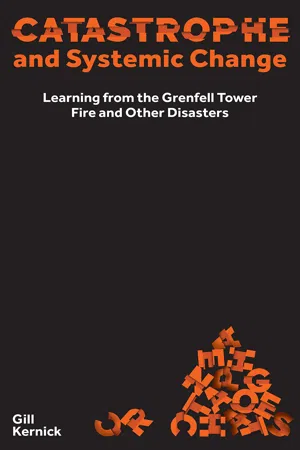
Catastrophe and Systemic Change: Learning from the Grenfell Tower Fire and Other Disasters
- 272 pages
- English
- ePUB (mobile friendly)
- Available on iOS & Android
Catastrophe and Systemic Change: Learning from the Grenfell Tower Fire and Other Disasters
About this book
The Grenfell Tower tragedy was the worst residential fire in London since World War II. It killed seventy-two people in the richest borough of one of the wealthiest countries in the world. Like other catastrophic events before it and since, it has the power to bring about lasting change. But will it? The historical evidence is weighed against 'lessons being learned' in a meaningful or enduring way. In an attempt to understand why, despite enormous efforts, we persistently fail to learn from catastrophic events, this book uses the details of the Grenfell fire as a case study to consider why we don't learn and what it would take to enable real systemic change. The book explores the myths, the key challenges and the conditions that inhibit learning, and it identifies opportunities to positively disrupt the status quo. It offers an accessible model for systemic change, not as a definitive solution but rather as a framework to evoke reflection, enquiry and proper debate. Catastrophe and Systemic Change is a must-read book for a wide range of readers including those interested in change management, leadership, policy-making, law, housing, construction and public safety.
Frequently asked questions
- Essential is ideal for learners and professionals who enjoy exploring a wide range of subjects. Access the Essential Library with 800,000+ trusted titles and best-sellers across business, personal growth, and the humanities. Includes unlimited reading time and Standard Read Aloud voice.
- Complete: Perfect for advanced learners and researchers needing full, unrestricted access. Unlock 1.4M+ books across hundreds of subjects, including academic and specialized titles. The Complete Plan also includes advanced features like Premium Read Aloud and Research Assistant.
Please note we cannot support devices running on iOS 13 and Android 7 or earlier. Learn more about using the app.
Information
Systemic Change
and Other Disasters
www.londonpublishingpartnership.co.uk
Enlightenment Economics
www.enlightenmenteconomics.com
ISBN: 978-1-913019-31-0 (epub)
available from the British Library
T&T Productions Ltd, London
www.tandtproductions.com
Mike Reynolds ([email protected])
Louis Auret Kernick
(7 August 1930–24 June 2017)
It was black and long and burnt in the sky.
Table of contents
- Introduction: the book I wish I’d never had to write
- Part I
- Part II
- Analysis and reflections
- Acknowledgements